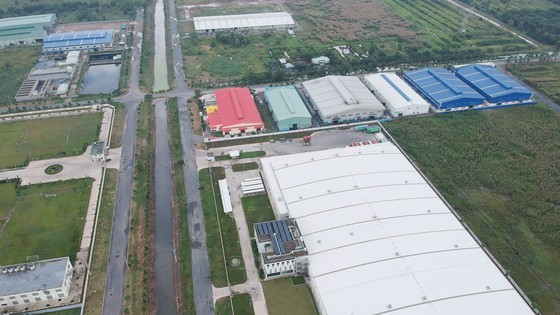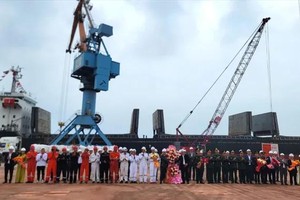 A corner of Le Minh Xuan Industrial Park. (Photo: SGGP)
A corner of Le Minh Xuan Industrial Park. (Photo: SGGP)
The difficulties restricts the wisdom
Currently, 90 percent of enterprises nationwide have small and medium-sized and even super small production scale. Therefore, it is not easy for enterprises to access commercial loans or budget support. Ms. Le Nguyen Duy Oanh, Deputy Director of the Ho Chi Minh City Center of Supporting Industries Development under the HCMC Department of Industry and Trade, said that to get loans, most enterprises must have collaterals. However, not all enterprises can satisfy this condition. And yet, many enterprises have invested in export processing zones and industrial zones, but because the provinces and cities have not determined the land rental prices, these enterprises have not been granted land-use right certificates. As a result, enterprises cannot mortgage assets to have more investment capital.
Analyzing barriers in lending activities, especially budget support, Mr. Nguyen Ngoc Hoa, Chairman of HCMC Finance and Investment State-owned Company, said that there are regulations on the use of budget support no longer suitable for the development of businesses. For instance, in HCMC - where about 300,000 domestic enterprises are operating, for many years, the land rental prices for investment and production have highly increased, forcing many enterprises to move or expand their factories to neighboring provinces, and leave their head offices in the city. These enterprises are in dire need of capital support to convert production technology but they cannot access support loans of the city because their factories are outside the administrative territory of the city although their head offices are still located in the city. This situation also happened at many investment funds from the State budget of provinces. Not to mention that administrative procedures related to lending activities, especially budget support are extremely difficult.
In fact, recently, many foreign investment funds have entered the capital supply market for Vietnam. Accordingly, the lending organizations can handle working capital loans for enterprises through contracts and invoices. However, the lending interest rates are quite high, while domestic enterprises are under fierce competition pressure with foreign enterprises, so they cannot access this source of capital as well.
From another perspective, domestic enterprises also face the psychological barrier of “afraid of growing big”. The situation of abusing and harassing enterprises through specialized inspection and examination activities of ministries and agencies is still quite popular. When enterprises "emerge", it also means that they will be "bothered" more. Therefore, many enterprises choose to "dive deeply" to be "peaceful". As difficulties pile up, so many enterprises have chosen the solution of "the smaller the boat is, the fewer waves it encounters". However, because the scale of operation is too small, there is no opportunity to accumulate internal resources, so domestic enterprises are extremely vulnerable when facing shocks in the market.
Moreover, although Vietnam is an exporting country in the top 10 exporters in the world in many fields, domestic enterprises depend a lot on imported raw materials. This makes domestic enterprises develop unstably, reducing their ability to compete sustainably in the global market. For instance, the breakage of the global raw material supply chain from 2020 to now has caused many domestic enterprises to stumble. Mr. Do Phuoc Tong, Chairman of the Board of Members of Duy Khanh Mechanical Company, said that in 2020, enterprises must look everywhere to seek alternative material sources. From the beginning of this year, the global supply has fallen sharply, causing the prices of raw materials to escalate steeply. Raw iron and steel prices have climbed by 40 percent compared to the end of last year. Earlier, many plastic manufacturers also had to announce an increase in product prices to customers because raw material prices had surged by 30 percent. If this situation lasts long, it will be very difficult for enterprises to maintain export market share, as well as domestic market share.
Accelerating digitization
Information from the General Statistics Office of Vietnam shows that since the outbreak of the Covid-19 pandemic, more than 140,000 enterprises have had to leave the market. Another survey assessing the negative impacts of the pandemic on the activities of enterprises also shows that up to 57.7 percent of enterprises have a sharp decrease in the consumption market. Noticeably, among enterprises with export activities, up to 47.2 percent of them confirmed that goods could not be exported.
Mr. Tran Viet Anh, Vice Chairman of HCMC Union of Business Association, emphasized that the Government has recognized the important role of the private economy in economic development. However, along with that, it is necessary to acknowledge the shortcomings in the private economic development ecosystem. For the domestic private economy to contribute more to economic growth, the Government needs to drastically remove barriers to administrative procedures for investment loans. Besides, it is necessary to strictly punish ministries that still keep or issue new unreasonable specialized barriers, causing economic losses to enterprises. At the same time, the fact that authorities and localities take advantage of inspection activities to harass enterprises needs to be strongly dealt with.
In the long run, experts said that the Government needs to accelerate the digitization of the economy. Besides, with foreign investment inflows pouring heavily into Vietnam, it is necessary to have a policy of "selective investment attraction". Accordingly, the Government should only attract quality FDI inflows that are environmentally friendly, apply high technologies, are not labor-intensive, and must contribute to the economic growth and development of the country. Especially, priority should be given to enterprises that invest in the production of raw materials that serve the main export industries of the country and support sustainable export activities. Finally, it is necessary to set up venture financial investment funds to promote the start-up movement and create groundbreaking boosts in economic development.
Moreover, it is necessary to have focused and proper investment in the market. Of which, for the domestic market, it is necessary to focus on supporting the business community to remove difficulties in product consumption, promote the program "Vietnamese people prioritize using Vietnamese goods", support taxes and export fees, and increase activities to stimulate domestic consumption. For foreign markets, it is essential to deploy export promotion activities, continue to carry out activities to connect supply and demand, trade promotion, support enterprises to build brands along with exporting branded goods, creating a foundation for Vietnamese goods to enter deeply and firmly in the foreign markets.
Currently, 90 percent of enterprises nationwide have small and medium-sized and even super small production scale. Therefore, it is not easy for enterprises to access commercial loans or budget support. Ms. Le Nguyen Duy Oanh, Deputy Director of the Ho Chi Minh City Center of Supporting Industries Development under the HCMC Department of Industry and Trade, said that to get loans, most enterprises must have collaterals. However, not all enterprises can satisfy this condition. And yet, many enterprises have invested in export processing zones and industrial zones, but because the provinces and cities have not determined the land rental prices, these enterprises have not been granted land-use right certificates. As a result, enterprises cannot mortgage assets to have more investment capital.
Analyzing barriers in lending activities, especially budget support, Mr. Nguyen Ngoc Hoa, Chairman of HCMC Finance and Investment State-owned Company, said that there are regulations on the use of budget support no longer suitable for the development of businesses. For instance, in HCMC - where about 300,000 domestic enterprises are operating, for many years, the land rental prices for investment and production have highly increased, forcing many enterprises to move or expand their factories to neighboring provinces, and leave their head offices in the city. These enterprises are in dire need of capital support to convert production technology but they cannot access support loans of the city because their factories are outside the administrative territory of the city although their head offices are still located in the city. This situation also happened at many investment funds from the State budget of provinces. Not to mention that administrative procedures related to lending activities, especially budget support are extremely difficult.
In fact, recently, many foreign investment funds have entered the capital supply market for Vietnam. Accordingly, the lending organizations can handle working capital loans for enterprises through contracts and invoices. However, the lending interest rates are quite high, while domestic enterprises are under fierce competition pressure with foreign enterprises, so they cannot access this source of capital as well.
From another perspective, domestic enterprises also face the psychological barrier of “afraid of growing big”. The situation of abusing and harassing enterprises through specialized inspection and examination activities of ministries and agencies is still quite popular. When enterprises "emerge", it also means that they will be "bothered" more. Therefore, many enterprises choose to "dive deeply" to be "peaceful". As difficulties pile up, so many enterprises have chosen the solution of "the smaller the boat is, the fewer waves it encounters". However, because the scale of operation is too small, there is no opportunity to accumulate internal resources, so domestic enterprises are extremely vulnerable when facing shocks in the market.
Moreover, although Vietnam is an exporting country in the top 10 exporters in the world in many fields, domestic enterprises depend a lot on imported raw materials. This makes domestic enterprises develop unstably, reducing their ability to compete sustainably in the global market. For instance, the breakage of the global raw material supply chain from 2020 to now has caused many domestic enterprises to stumble. Mr. Do Phuoc Tong, Chairman of the Board of Members of Duy Khanh Mechanical Company, said that in 2020, enterprises must look everywhere to seek alternative material sources. From the beginning of this year, the global supply has fallen sharply, causing the prices of raw materials to escalate steeply. Raw iron and steel prices have climbed by 40 percent compared to the end of last year. Earlier, many plastic manufacturers also had to announce an increase in product prices to customers because raw material prices had surged by 30 percent. If this situation lasts long, it will be very difficult for enterprises to maintain export market share, as well as domestic market share.
Accelerating digitization
Information from the General Statistics Office of Vietnam shows that since the outbreak of the Covid-19 pandemic, more than 140,000 enterprises have had to leave the market. Another survey assessing the negative impacts of the pandemic on the activities of enterprises also shows that up to 57.7 percent of enterprises have a sharp decrease in the consumption market. Noticeably, among enterprises with export activities, up to 47.2 percent of them confirmed that goods could not be exported.
Mr. Tran Viet Anh, Vice Chairman of HCMC Union of Business Association, emphasized that the Government has recognized the important role of the private economy in economic development. However, along with that, it is necessary to acknowledge the shortcomings in the private economic development ecosystem. For the domestic private economy to contribute more to economic growth, the Government needs to drastically remove barriers to administrative procedures for investment loans. Besides, it is necessary to strictly punish ministries that still keep or issue new unreasonable specialized barriers, causing economic losses to enterprises. At the same time, the fact that authorities and localities take advantage of inspection activities to harass enterprises needs to be strongly dealt with.
In the long run, experts said that the Government needs to accelerate the digitization of the economy. Besides, with foreign investment inflows pouring heavily into Vietnam, it is necessary to have a policy of "selective investment attraction". Accordingly, the Government should only attract quality FDI inflows that are environmentally friendly, apply high technologies, are not labor-intensive, and must contribute to the economic growth and development of the country. Especially, priority should be given to enterprises that invest in the production of raw materials that serve the main export industries of the country and support sustainable export activities. Finally, it is necessary to set up venture financial investment funds to promote the start-up movement and create groundbreaking boosts in economic development.
Moreover, it is necessary to have focused and proper investment in the market. Of which, for the domestic market, it is necessary to focus on supporting the business community to remove difficulties in product consumption, promote the program "Vietnamese people prioritize using Vietnamese goods", support taxes and export fees, and increase activities to stimulate domestic consumption. For foreign markets, it is essential to deploy export promotion activities, continue to carry out activities to connect supply and demand, trade promotion, support enterprises to build brands along with exporting branded goods, creating a foundation for Vietnamese goods to enter deeply and firmly in the foreign markets.
























